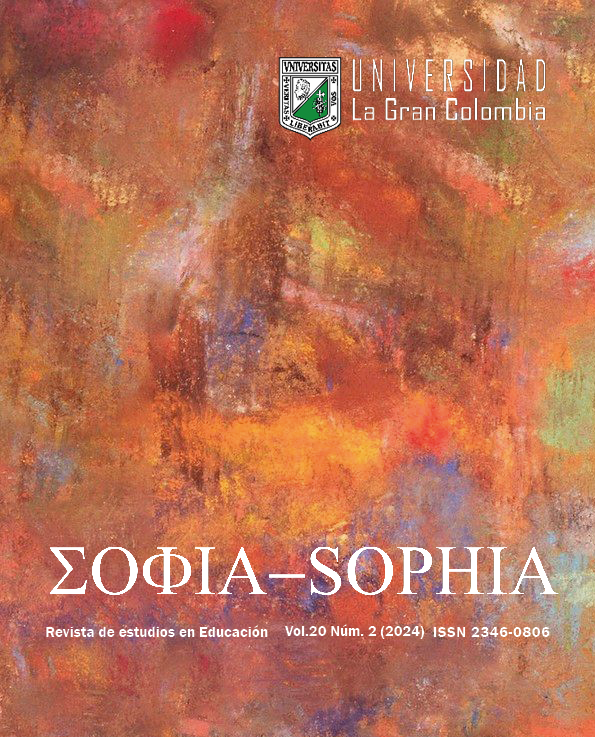Ecoturismo e conscientização ambiental: uma estratégia de educação ambiental para jovens universitários
DOI:
https://doi.org/10.18634/sophiaj.20v.2i.1498Palavras-chave:
Ecoturismo, conscientização ambiental, educação ambiental, jovens universitários, conservação ambientalResumo
O objetivo deste artigo foi avaliar a relação entre o ecoturismo e a conscientização ambiental entre os estudantes universitários da região da Surcolômbia. Para isso, as variáveis de ecoturismo (variável independente) e consciência ambiental (variável dependente) foram abordadas como variáveis multidimensionais. O estudo foi quantitativo, usando o método dedutivo e a pesquisa descritiva. A população estudada foi de estudantes universitários e a amostra foi não probabilística em sua tipologia por conveniência. Foi pesquisado um total de 577 jovens universitários da região Surcolombiana. Para as variáveis de ecoturismo e consciência ambiental, os pesquisadores desenvolveram instrumentos baseados em vários estudos existentes na literatura. O alfa de Cronbach e a confiabilidade composta foram usados para determinar o nível de confiança, e a variância média explicada e a análise fatorial confirmatória foram usadas para estabelecer a validade, obtendo níveis satisfatórios de confiança e validade. Os resultados obtidos mostraram uma relação positiva e significativa entre a experiência de ecoturismo e a consciência ambiental (0,694; p < 0,00). Em conclusão, os resultados reforçam a ideia de que o ecoturismo pode ser uma estratégia de educação ambiental que permite melhores níveis de conscientização ambiental nas gerações mais jovens, o que pode contribuir para a preservação do meio ambiente. Por fim, os resultados estão de acordo com pesquisas que mostram alguma relação causal entre as variáveis.Referências
Ambe, B. A., & Agbor, C. E. (2014). Assessment of teacher's professional competence, teacher's teaching experience on the implementation of environmental education curriculum in cross river state, Nigeria. Journal of Educational and Social Research, 4(6), 521-521.
Ambe, B.A., Agbor, C.E., Amalu, M.N., Ngban, A.N., Bekomson, A.N., Etan, M.O., Ephraim, I.E., Asuquo, E.E., Eyo, O.E., & Ogunjimi, J.O. (2024). Electronic Media Learning Technologies and Environmental Education Pedagogy in Tertiary Institutions in Nigeria. Soc. Sci. Humanit. Open, 9, 100760. https://doi.org/10.1016/j.ssaho.2023.100760
Andrade Navia, J. M., Jiménez Zapata, E., Hembuz Falla, G., Santos Sánchez, S., & Castro Guevara, D. (2024). Environmental awareness of university students in Colombia. Knowledge and Performance Management, 8(1), 104-114. https://doi.org/10.21511/kpm.08(1).2024.08
Andrade, J. M., Peña, L. C., & Palencia, S. Y. (2023). Impactos ambientales derivados del ecoturismo alrededor del mundo. Aglala, 14(2), 205–225. https://revistas.uninunez.edu.co/index.php/aglala/article/view/2392
Anup, K. C., K., Rijal, & Sapkota, R. P. (2015). Role of ecotourism in environmental conservation and socioeconomic development in Annapurna conservation area, Nepal. International Journal of Sustainable Development & World Ecology, 22(3), 251–258. https://doi.org/10.1080/13504509.2015.1005721
Bagri, S., Gupta, B., & George, B. (2009). Environmental orientation and ecotourism awareness among pilgrims, adventure tourists, and leisure tourists. Tour. Int. Interdiscip. J., 57(1), 55–68. https://hrcak.srce.hr/52941
Baral, N., Stern, M. J., & Hammett, A. L. (2012). Developing a scale for evaluating ecotourism by visitors: a study in the Annapurna Conservation Area, Nepal. Journal of Sustainable Tourism, 20(7), 975–989. https://doi.org/10.1080/09669582.2012.663379
Bishop, K., Reid, A., Stables, A., Lencastre, M., Stoer, S., & Soetaert, R. (2000). Developing Environmental Awareness through Literature and Media Education: Curriculum Development in the Context of Teachers’ Practice. Canadian Journal of Environmental Education, 5(1), 268-286. http://hdl.handle.net/1854/LU-132634
Bozoglu, M., Bilgic, A., Topuz, B. K., & Ardali, Y. (2016). Factors affecting the students’ environmental awareness, attitudes and behaviors in Ondokuz Mayis University, Turkey. Fresenius Environmental Bulletin, 25(4), 1243-1257. https://avesis. atauni.edu.tr/yayin/cd036a2bb9ea-49f7-b259-0e9f03a55cfb/ factors-affecting-the-students-environmental-awareness-attitudesand-behaviors-in-ondokuz-mayisuniversity-turkey
Carlson, R. (1997). Experienced cognition New York: Lawrence Erlbaum Associations.
Chawla, L., & Cushing, D. F. (2007). Education for strategic environmental behavior. Environmental Education Research, 13(4), 437–452. https://doi.org/10.1080/13504620701581539
Chiu, Y.-T.H., Lee, W.-I., & Chen, T.-H. (2014). Environmentally responsible behavior in ecotourism: Antecedents and implications. Tour. Manag., 40, 321–329. https://doi.org/10.1016/j.tourman.2013.06.013
Creswell, J. W., & Poth, C. N. (2018) Qualitative Inquiry and Research Design Choosing among Five Approaches (4th ed.). SAGE Publications, Inc., Thousand Oaks.
Dargahov, V. S., Mammadov, Q. V., Nuriyeva, I. F., & Ahmadov, R. I. (2023). Prospects of using the tourism potential of the liberated territories from the point of view of ecotourism. J. Geol. Geogr. Geoecology, 32(2), 224–232. https://doi.org/https://doi.org/10.15421/112321
Dawson, C. (2007). Wilderness as a place: Human dimensions of the wilderness experience. In: De Rojas, C., and Camarero, C. (2008). Visitors’ experience, mood and satisfaction in a heritage context: Evidence from an interpretation center. Tourism Management, 29(3), 525-537.
Eagles, P.F.J., & McCool, S.F. (2002). Tourism in National Parks and Protected Areas: Planning and Management. Cabi Publishing: Wallingford.
Fletcher, R. (2011). Sustaining tourism, sustaining capitalism? The tourism industry’s role in global capitalist expansion. Tour. Geogr., 13, 443–461. https://doi.org/10.1080/14616688.2011.570372
Frankovský, M. (2012). Možnosti zisťovania environmentálneho povedomia. Journal of Management and Business: Research and Practice, 4(1), 7-14.
George, D, & Mallery, P. (2003). SPSS for Windows step by step: A simple guide and reference 11.0 update. Boston: Allyn & Bacon.
Green, S. B., & Yang, Y. (2015). Evaluation of dimensionality in the assessment of internal consistency reliability: coefficient Alpha and Omega coefficients. Educational Measurement: Issues and Practices, 34(4), 14-20. https://doi.org/10.1111/emip.12100
Hair, J. F., Black, W. C., Babin, B. J., & Anderson, R. E. (2010). Multivariate data analysis: A global perspective (7a ed.). Upper Saddle River, NJ: Prentice Hall.
Hair, J. F., Hult, G. T. M., Ringle, C. M., Sarstedt, M., Danks, N. P., & Ray, S. (2021). Evaluation of Reflective Measurement Models. In Partial Least Squares Structural Equation Modeling (PLS-SEM) Using R. Classroom Companion: Business (pp. 75-90). https://doi. org/10.1007/978-3-030-80519-7_4
Ham, M., Jeger, M., & Ivković, A. F. (2015). The role of subjective norms in forming the intention to purchase green food. Economic Research-Ekonomska Istraživanja, 28(1), 738-748. https://doi.org/10. 1080/1331677X.2015.1083875
Honey, M. (2008). Ecotourism and sustainable development: Who owns paradise? (2nd ed.). Island Press
Jalani, J.O. (2012). Local people’s perception on the impacts and importance of ecotourism in Sabang, Palawan, Philippines. Procedia Soc. Behav. Sci., 57(9), 247–254. https://doi.org/10.1016/j.sbspro.2012.09.1182
Jöreskog, K. G., Olsson, U. H., & Wallentin, F. Y. (2016). Confirmatory factor analysis (CFA). In Multivariate analysis with LISREL (pp. 283-339). Springer series in statistics. Springer, Switzerland. https://doi.org/10.1007/978-3319-33153-9_7
Kalaycı Alas, D., & Korutürk, K. (2024). Exploring the Impact of Values Education on Sustainable Environmental Awareness and Behavior Among Eighth-Grade Students. Sustainability, 16(21), 9302. https://doi.org/10.3390/su16219302
Khanra, S., Dhir, A., Kaur, P., & Mäntymäki, M. (2020). Bibliometric analysis and literature review of ecotourism: Toward sustainable development. Tour. Manag. Perspect., 37, 100777. https://doi.org/10.1016/j.tmp.2020.100777
Kontogeorgopoulos, N., & Chulikavit, K. (2010). Supply-side perspectives on ecotourism in Northern Thailand. International Journal of Tourism Research, 12(5), 627-641. https://doi.org/10.1002/jtr.785
Kundačina, M. (2006). Činioci ekološkog vaspitanja i obrazovanja učenika [Factors of the environmental education of students]. Užice, Srbija: Učiteljski fakultet.
Maloney, M.P., & Ward, M.P. (1973). Ecology: Let’s hear from the people: An objective scale for the measurement of ecological attitudes and knowledge. American Psychologist, 28(7), 583–586. https://psycnet.apa.org/doi/10.1037/h0034936
Marković, D. (2005). Socijalna ekologija [Social ecology]. Beograd: Zavod za udžbenike i nastavna sredstva.
Lidskaya, E.V., & Mdivani, M.O. (2017). Ecological consciousness of children 6-10 years old from the point of view of dialectical thinking. Psychological Science and Education, 22(6), 77-86. https://doi.org/10.17759/pse.2017220607
McIntyre, N., & Roggenbuck, J. W. (1998). Nature/person transactions during an outdoor adventure experience: A multiphase analysis. Journal of Leisure Research, 30, 401-422. https://doi.org/10.1080/00222216.1998.11949841
Monroe, M. C., Andrews, E., & Biedenweg, K. (2008). A Framework for Environmental Education Strategies. Applied Environmental Education & Communication, 6(3–4), 205–216. https://doi.org/10.1080/15330150801944416
Negev, M., Sagy, G., Garb, Y., Salzberg, A., & Tal, A. (2008). Evaluating the environmental literacy of Israeli elementary and high school students. Journal of Environmental Education, 39(2), 3–20. https://doi.org/10.3200/JOEE.39.2.3-20
Otzen, T., & Manterola, C. (2017). Técnicas de Muestreo sobre una población a estudio. International Journal of Morphology, 35(1), 227232. http://dx.doi.org/10.4067/ S0717-95022017000100037
Rupprecht, C. D., Byrne, J. A., & Lo, A. Y. (2016). Memories of vacant lots: how and why residents used informal urban green space as children and teenagers in Brisbane, Australia, and Sapporo, Japan. Children’s Geographies, 14(3), 340-355. https://doi.org/10.1080/14733285.2015.1048427
Seekamp, E., Hall, T., & Cole, D. (2012). Visitors’ conceptualizations of wilderness experiences. In: USDA Forest Service Proceedings RMRS-P-66; pp 50-61.
Statista (2024). Evolución de la aportación del sector turístico al PIB en el mundo de 2006 a 2023 (en billones de dólares). Turismo y hotelería. https://es.statista.com/estadisticas/640133/aportacion-del-sector-turistico-al-pib-mundial/
Üzülmez, M., Ercan˙I¸stin, A., & Barakazı, E. (2023). Environmental Awareness, Ecotourism Awareness and Ecotourism Perception of Tourist Guides. Sustainability, 15, 12616. https://doi.org/10.3390/su151612616
Xue, P., Wei, Z., & Yi, H. (2023). An analysis of environmental awareness among Chinese higher education groups due to differences in different majors. E3S Web of Conferences, 393, 01028. https://doi.org/10.1051/e3sconf/202339301028
Yang, B., Wu, N., Tong, Z., & Sun, Y. (2022). Narrative-Based Environmental Education Improves Environmental Awareness and Environmental Attitudes in Children Aged 6–8. International Journal of Environmental Research and Public Health, 19, 6483. https:/doi.org/10.3390/ijerph19116483
Downloads
Publicado
Edição
Seção
Licença
Esta obra está bajo una licencia de CREATIVE COMMONS








